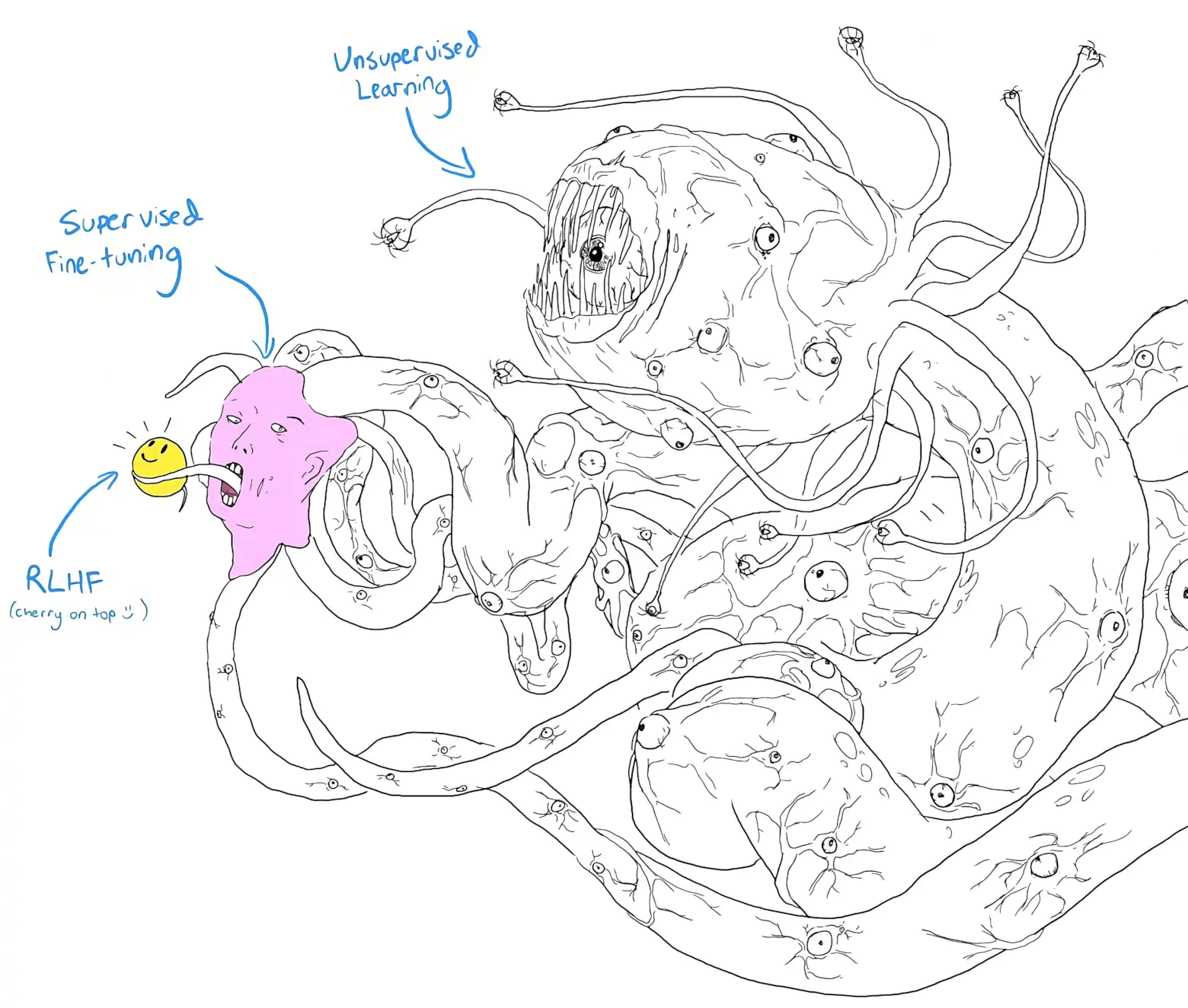Contemporary techno-horror
On eldritch terrors from beyond and their Twitter accounts
December 23, 2019 — February 19, 2023
Suspiciously similar content
Content warning:
Horror themes, racism, sexism, homophobic, probably other prejudices
Recreationally staring into the abyss. I do enjoy a bit of horror fiction, especially with a political inflection.
I am interested in examining some trends in recent horror writers (who I will call horrorists to save a syllable). But rather than getting to the core, here is a lightly decorated listicle of trends and thoughts I may get around to packaging up into a real essay later.
Some of the writers on this list share a red-pill motif, in the sense of the feeling of horror arising from seeing painful truths that the snowflakes can’t handle. And the painful truth is that the horror is other people. Probably, in fact, other people who look different than the imagined audience, or the author. Maybe black people, if you believe you are talking to white people. Or women; I’m aware there is only one woman on this author list. Quasi-biological-class-determinist, Houellebecq and Deep-State-is-Cthulhu-Actually, Zero HP Lovecraft, could serve as waypoints along a red-piller’s path to the endimming. Indeed, a dark enlightenment progenitor, Nick Land a.k.a. The Whiteness Out Of Space, is a horror writer.
A recurring theme (Houellebecq, Tacos, Zero HP Lovecraft) is pluralistic ignorance, i.e. the real horror is that we are all surviving in a vicious social norm that we individually secretly hate but publicly endorse for fear of censure. In this Emperor’s-new-clothes variant of the Cassandra myth, the protagonists can see the truth but cannot say it for fear of being pilloried by other Cassandras. The Cassandras are locked in a dilemma of collective action. The author, in these cases, is the real Cassandra who dares to speak the forbidden truths but will not be believed by society at large. This particular horror fails to land for me personally, because it does not tally with any experience I have had. Maybe I am that one arsehat who is happy with the social norm, and by enforcing it ruining it for the silent masses?
The kind of awful inescapable horror I more often fear is the moral maze, where we can all see and acknowledge that the situation is not ideal but our local incentives mean that we nonetheless cannot escape. In stylised examples, if you talk about things in a pluralistic-ignorance-kind of horror, the imagined risk is the condemnation by other patsies. “Maybe this thing that most people think is bad is actually bad” you say, and all the other bad-thing-haters punish you for stepping out of line for speaking the truth. Probably on Twitter. In a moral-maze-kind, the horror is more that we all know we are in it together but are still doomed. “Oh no, would it not be great if we were not all part of the problem?” you ask, “Yes, but how can we get there? My kids have to eat,” your colleagues answer, then your kids end up stabbing each other in the streets over food. This is the kind of horror that, e.g. Peter Watts writes, where we are all turned into monsters by going down a path where at every step we chose the least monstrous option. Which type of horror lands for you depends possibly upon experiences, attachment styles, paranoia etc.
The incomprehensible dread of the mediated digital world is another thread through these. Consider the conspiracy mania sweeping the internet, which is taking an occult turn. Or the uncanniness of the internet itself. Margot Harrison: Or The Social Construction of R’yleh.
That old aesthetic term for creeping dread, famously dissected by Freud, is typically now applied to disturbing specimens of digital animation said to reside in the “uncanny valley.”
[…] The dead live on in their videos and social media feeds. Thanks to targeted advertising, a pair of boots we put in our cart months ago stalks us at every turn. The notion that a single utterance can turn a random citizen into an influencer might have sounded to Freud like magical thinking. We see it happen every day.
Or consider the uncanny motif of the double, which has inspired writers of dread from Dostoyevsky to Tana French. The fear of having our identity appropriated by a look-alike doesn’t seem atavistic in the era of catfishing and deepfakes. We all lead parallel lives in which presence is absence and reality is malleable.
But I think there are more uncanny and dangerous systems we are aware of than the merely digital. Economist Bryan Caplan is briefly and provocatively a horrorist in this excellent metaphor about minimum wage:
I honestly wonder if we’d have better luck explaining economics if we used the metaphor of a terrifying and incomprehensible alien deity that is kept barely contained by a complicated and humanly meaningless ritual, and that if somebody upsets the ritual prices then It will break loose and all the electrical plants will simultaneously catch fire. Because that probably is the closest translation of the math we believe into a native human ontology.
Want to help the bottom 30%? Don’t scribble over the mad inscriptions that are closest to them, trying to prettify the blood-drawn curves. Mess with any other numbers than those, move money around in any other way than that, because It is standing very near to them already.
I love this explanation. There is something deep going on in it. Quibbles: not only economics can own the eldritch horror of its subject matter; probably every social science can. And marine biology. Also I disagree with his characterisation of why one might support minimum wages (tl;dr: electoral pragmatics rather than economic optimality), but that is an essay under a different heading.
Noah Smith, Lovecraftian intelligence:
Lovecraftian intelligences are so alien that we’ll never really be able to resolve the argument over whether they’re truly intelligent or not. But unlike other alien intelligences that display their incomprehensibility at all times, Lovecraftian intelligences trick us most of the time—they seem human right up until they don’t. And this is an inherent property of the way they’re created—in the case of Lovecraft’s horrors, they’re the product of a fantasy author’s twisted mind, and in the case of AIs they’re tools that we create to do our bidding. They are a product of humanity, and this is what allows them to be so creepy to humans.
Ok, diverse abysses to gaze into. Gaze on. There was also my goodreads list, no longer maintained. See also Nightmare Fuel.
Something like scpwiki makes a horror fan-fiction of reality. See, e.g. infinite IKEA.
Ric Royer, The Horror is that There is No Horror
Beyond the happy endings, commercialization, reduced violence, and cops tying a bow on it all, horror films that exploit our era of extreme partisanship tend to be a low-risk, conservative venture. As horror legend John Carpenter notes, these narratives are not only easy stories to tell, but easy to sell: “The easiest story that people will buy … is that evil is out there, beyond the woods, beyond the dark, the evil is the other … because the audience is always going to respond to the ‘other.’ It unifies us as a tribe.”
Yokay here are some recommendations.
1 Peter Watts
Everything this former marine biologist touches turns into posthuman ooze. (“What if the real grey goo was inside your skull all along?”) Gritty depictions of a future in which humans are cockroaches in the diverse biome of posthuman life and which eradicates them in incomprehensible ways. Recommended: The Firefall series, in which the superior post-humans that rule the future rarely stop to explain their fears to humans about the even more superior aliens that pop by.
2 Charlie Stross
Mostly Laundry Files, a series gradually sliding from public-service/dotcom office snark into dark technological Sleeper-in-the-Pyramid weirdness. The density of the puns is decreasing as their magnitude increases throughout the series.
3 Heide Goody and Iain Grant
The Odd Jobs series is Birmingham comedy civil service horror. The monsters from beyond have a flavour of Brexit-climate-change-with-tentacles. I find it satisfying and cathartic and relatable in a prim medium-density-urban kind of way. The upwardly-mobile god monsters send their kids to private schools and worry about landscaping in between sucking out souls.
4 Zero H.P. Lovecraft
This guy can turn an arresting phrase and a horrific image, in e.g., God-Shaped Hole, a tale of an augmented reality future in which our wistfully unsocialised protagonist and his PUA AI dating assistant encounter the spammy post-human dark sex gods arisen from Generative Amorous Networks.
Aside: I suspect Zero leans neoreactionary based on his tweets, which makes me wonder vaguely if some of the layers of horror a conservative would experience in his stuff passed me by. (UPDATE: yeah, he is deep in the frog right.) Maybe there would be still more if I were terrorised by the hot queer robot sex motifs. 🤷♂ Anyway, there is still enough macabre to go around, and social media future extrapolation is slickly done.
5 Michel Houellebecq
He wrote a biography of H.P. Lovecraft and Atomised is full of a certain type of biological horror so I’ll count him. His later books seem to be more what I might describe as things-that-scare-baby-boomers, which have not grabbed me so much.
6 Delicious Tacos
Another marginal entrant in this classification. The pseudonymous Delicious Tacos(https://hooverhog.typepad.com/hognotes/20 This book to me had the flavour of a bunch of separately tasty ingredients stirred together into an undifferentiated mess. Also, cardinal sin in my narrative preferences: lack of structural payoff. Spoiler: There is no room for a plot twist; it is displaced by perpetual plot wringing.
Further, this tale does not relate to my world. I prefer my horror connected to my lived experience by stronger sinews than this; there is no horrifyingly plausible version of my future in here, no alternative vision of my present, no matter how much I say woooooo but is it actually? This is a parable about a world which I clearly cannot visit and in which I have no pen-pals.
Recommended for lovers of numinous fungus.
7 Incoming
8 Why is it always molluscs?
Anna C. de A. Salles, Marcelo P. G. da Silva & Cléo D. de C. Oliveira, Malacological representativeness in eco-horror movies – Journal of Geek Studies
To verify the malacological taxonomic representativeness (that is, mollusks) in eco-horror films, a survey was carried out in five cinematographic database sites: Internet Movie Database (IMDb); Movie Monster Fandom; The Movie Database (TMDb); The TV Database (The TVDB); and Rotten Tomatoes. The following keywords were used for the search: Octopus; Tentacles; Squid; Molluscum; Mollusk; Slug; Snail; Oyster; Clam; Mussel; and Shellfish.
If AI were Cephalopod - 0rphan Drift Archive
In thinking about an octopus-like AI having the ability to surveil and implement predictive analytics, we are rather inspired by a generative adversarial neural net ‘reinforced’ learning model whereby the AI/algorithm learns from its environment rather than learns to match data input with a sociopolitical analytic agenda i.e. our imagining into the octopus’s distributed consciousness is underpinned by a desire to resist the evolution of AI as a surveilling and predictive modelling tool. Rather to embrace a plastic, opportunistic, fluid, protean otherness embodied by the octopus. The deliberate uncertainty of figure, ground, planes, frames and image relationships in the work is an attempt to give the viewer an embodied and perceptual experience that is fluid, unfixed and morphing.
9 What is people?
- Neural nets are just people all the way down (Converse is also probably true)
- Artificial intelligence is a familiar-looking monster, say Henry Farrell and Cosma Shalizi

